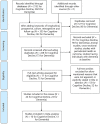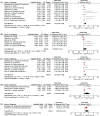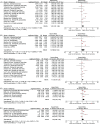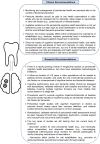Periodontal health, cognitive decline, and dementia: A systematic review and meta-analysis of longitudinal studies
- PMID: 36073186
- PMCID: PMC9826143
- DOI: 10.1111/jgs.17978
Periodontal health, cognitive decline, and dementia: A systematic review and meta-analysis of longitudinal studies
Abstract
Background: Emerging evidence indicates that poor periodontal health adversely impacts cognition. This review examined the available longitudinal evidence concerning the effect of poor periodontal health on cognitive decline and dementia.
Methods: Comprehensive literature search was conducted on five electronic databases for relevant studies published until April 2022. Longitudinal studies having periodontal health as exposure and cognitive decline and/or dementia as outcomes were considered. Random effects pooled estimates and 95% confidence intervals were generated (pooled odds ratio for cognitive decline and hazards ratio for dementia) to assess whether poor periodontal health increases the risk of cognitive decline and dementia. Heterogeneity between studies was estimated by I2 and the quality of available evidence was assessed through quality assessment criteria.
Results: Adopted search strategy produced 2132 studies for cognitive decline and 2023 for dementia, from which 47 studies (24 for cognitive decline and 23 for dementia) were included in this review. Poor periodontal health (reflected by having periodontitis, tooth loss, deep periodontal pockets, or alveolar bone loss) was associated with both cognitive decline (OR = 1.23; 1.05-1.44) and dementia (HR = 1.21; 1.07-1.38). Further analysis, based on measures of periodontal assessment, found tooth loss to independently increase the risk of both cognitive decline (OR = 1.23; 1.09-1.39) and dementia (HR = 1.13; 1.04-1.23). Stratified analysis based on the extent of tooth loss indicated partial tooth loss to be important for cognitive decline (OR = 1.50; 1.02-2.23) and complete tooth loss for dementia (HR = 1.23; 1.05-1.45). However, the overall quality of evidence was low, and associations were at least partly due to reverse causality.
Conclusions: Poor periodontal health and tooth loss appear to increase the risk of both cognitive decline and dementia. However, the available evidence is limited (e.g., highly heterogenous, lacking robust methodology) to draw firm conclusions. Further well-designed studies involving standardized periodontal and cognitive health assessment and addressing reverse causality are highly warranted.
Keywords: cognitive decline; dementia; periodontitis; tooth loss.
© 2022 The Authors. Journal of the American Geriatrics Society published by Wiley Periodicals LLC on behalf of The American Geriatrics Society.
Conflict of interest statement
The authors declare no conflicts of interest.
Figures




Comment in
-
Beyond the mouth: the impact of periodontal disease on dementia.Evid Based Dent. 2023 Sep;24(3):138-139. doi: 10.1038/s41432-023-00925-0. Epub 2023 Aug 9. Evid Based Dent. 2023. PMID: 37558763
References
Publication types
MeSH terms
Grants and funding
LinkOut - more resources
Full Text Sources
Medical
Miscellaneous

